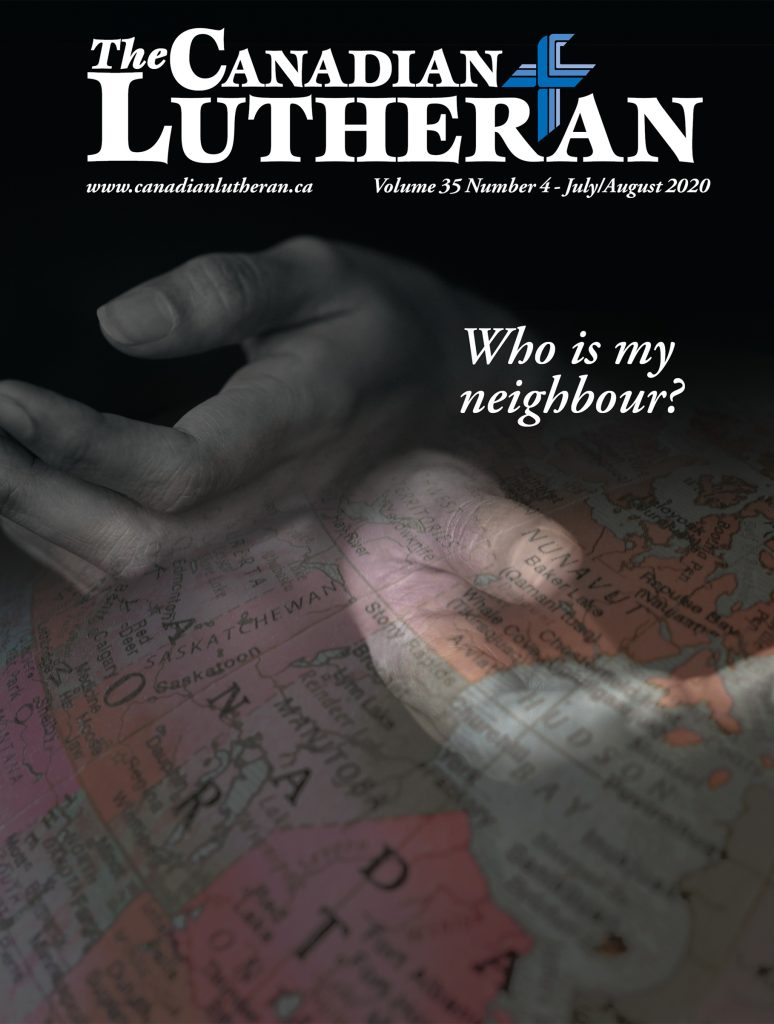Together, One
 by Mathew Block
by Mathew Block
“For just as the body is one and has many members, and all the members of the body, though many, are one body, so it is with Christ. For in one Spirit we were all baptized into one body—Jews or Greeks, slaves or free—and all were made to drink of one Spirit.” – 1 Corinthians 12:12-13
The horrific death of George Floyd and subsequent civil unrest have brought the issues of race and racism to renewed attention in North America. We have seen grief. We have seen anger. We have even seen violence.
As the Body of Christ, we are called to respond to the challenges of discrimination and societal discord with the good news of the Gospel, which is at its heart the story of the reconciliation of God to humankind. That wondrous reconciliation also makes possible reconciliation here on earth. This is, after all, the promise of the coming of Christ: God’s “good will toward men,” yes, but also “peace on earth” (Luke 2:14).
St. Paul, speaking of the unity Jews and Gentiles had newly found in Christ, writes: “He Himself is our peace, who has made us both one and has broken down in His flesh the dividing wall of hostility… that He might create in Himself one new man in place of the two, so making peace, and might reconcile us both to God in one body through the cross, thereby killing the hostility” (Ephesians 2:14-16).
Christ reconciles us to the Father, and so too He reconciles us one to another. St. Paul, speaking of the unity Jews and Gentiles had newly found in Christ, writes: “He Himself is our peace, who has made us both one and has broken down in His flesh the dividing wall of hostility… that He might create in Himself one new man in place of the two, so making peace, and might reconcile us both to God in one body through the cross, thereby killing the hostility” (Ephesians 2:14-16).
Christ has made all nations one in His own flesh, dying for them upon the cross and rising again. Our mutual life in Christ gives us grounds for a unity beyond what the world can imagine—not merely the cessation of open hostilities but instead true oneness in and through Christ. We are one body. We are His body. “There is neither Jew nor Greek,” St. Paul writes, “there is neither slave nor free, there is no male and female, for you are all one in Christ Jesus” (Galatians 3:28).
Our mutual life in Christ gives us grounds for a unity beyond what the world can imagine—not merely the cessation of open hostilities but instead true oneness in and through Christ. We are one body. We are His body.

That doesn’t mean our differences suddenly disappear when we become Christians. But it does mean these differences are of no account in our standing before God, nor with one another. We are equal in the eyes of Jesus; He has ransomed every person for Himself. It is our great privilege to share the news of this reconciliation to God and one another with our sorrow-full and sin-laden world.
We preach this reconciliation first to ourselves. We ought to pray for and pursue an ever-greater demonstration in our churches of the unity we already enjoy in the Spirit as Christians. St. Paul tells us that “we, though many, are one body in Christ, and individually members one of another” (Romans 12:5). And if we are members one of another, then we must seek to care for each other—to heal those injuries, like prejudice, which afflict fellow members in the Body of Christ. After all, “if one member suffers, all suffer together,” St. Paul says (1 Corinthians 12:26).
Embracing the unity we hold as members of the church, we can then step forth to bring the message of reconciliation to the wider world—to our families, to our neighbours, to our cities, and to our nations. We should seek justice for the oppressed. We should beg mercy for sinners. And over all, we must declare the Gospel of our Lord Jesus Christ—the reconciliation purchased with His precious blood and manifested in His living body, the Church.
Our features this issue will aid you as you contemplate the reconciliation which is ours in Christ. Rev. Dr. John Arthur Nunes teaches us to ask anew, “Who is my neighbour?”—and to consider what the answer might mean in our troubled times. Rev. Randy Heide asks us to remember in particular our First Nations brothers and sisters in Christ, how we can encourage and support them in their faith walk. And Javed Khan considers what sharing the Gospel looks like in a multicultural society, encouraging us to forge real and meaningful friendships with our neighbours of different cultural backgrounds.
If we are members one of another, then we must seek to care for each other—to heal those injuries, like prejudice, which afflict fellow members in the Body of Christ. After all, “if one member suffers, all suffer together,” St. Paul says (1 Corinthians 12:26).
“A new commandment I give to you, that you love one another” Jesus told the disciples. “Just as I have loved you, you also are to love one another” (John 13:34). That sacrificial love is the outworking of the unity we bear as members of the Body of Christ. It is, Jesus says, the very thing that reveals us as members of His body to the outside world: “By this all people will know that you are My disciples, if you have love for one another” (13:35).
God grant us unity then, that our love for one another would abound—that it would overflow and flood this land, drowning hate with the mercy of Christ. Reconcile us, O Lord, to You, and in You to one another.
———————
Mathew Block is editor of The Canadian Lutheran and communications manager for the International Lutheran Council.





